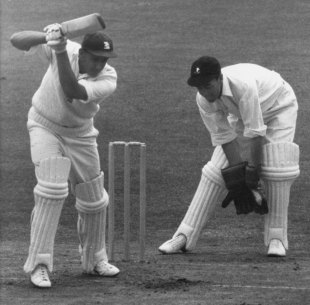John Waite

|
|||
|
Related Links
Players/Officials:
John Waite
Teams:
South Africa
|
|||
WAITE, JOHN HENRY BICKFORD, who died on June 22, 2011, aged 81, was "along with Les Ames, a prototype of the modern keeper-batsman", according to the former Wisden editor Scyld Berry. Waite was stylish and unfussy, if rather tall for a keeper at 6ft, and a fine strokemaker, good enough to play purely as a batsman on occasion. Waite was the only man to win 50 Test caps during the era when South Africa played solely against the so-called white nations. His career stretched from good times for the Test side - a stunning comeback to draw in Australia in 1952-53, and exciting series against England away (lost 3-2 in 1955) and at home (a 2-2 draw in 1956-57) - through the depths of a troubled tour of England in 1960, and back to prosperity as a senior member of the young team, including Eddie Barlow and the Pollock brothers, which took shape in the mid- 1960s. Waite's last two appearances for South Africa came when he was recalled against England in 1964-65: he was run out in both his innings.
Waite's Test career had also started, almost 14 years earlier, with a run-out following a polished 76, in four and a half hours, against England after opening at Trent Bridge in 1951. He was berated by his captain Dudley Nourse - in the middle of making 208 - for throwing away the chance of a century: "You need to keep your bloody mind on the job." Waite took that on the chin, even though umpire Frank Chester's run-out decision was later shown to be incorrect. But elsewhere on the tour he was vocal in his support for his team-mate Eric Rowan, who had been accused of insubordination during the game against Lancashire, in which he and Waite sat down in protest after being slow hand-clapped for slow scoring; there was later a scuffle in the pavilion. It is said this explained why Waite was never given a position of authority in the South African team. This didn't seem to bother him: in 1955 at Old Trafford, he made the first of his four Test hundreds, sharing a match-turning sixth-wicket stand of 171 with Paul Winslow. Relations with the irascible Rowan had not always been so cordial, though. After being picked for a South African XI against the 1949-50 Australian tourists, the 19-year-old Waite had put his kitbag down in the dressing-room, only for it to be thrown out of the window. "This is my place," yelled Rowan, "and don't you forget it."
With the gloves the ever-slender Waite claimed 23 dismissals, seven of them stumpings, in the home series against New Zealand in 1953-54, a record at the time, and improved that to 26 when New Zealand toured again in 1961-62. He formed a good understanding with the great off-spinner Hugh Tayfield, but also had to keep to the express bowling of Neil Adcock and Peter Heine, and later Peter Pollock. In first-class cricket Waite made 23 centuries, the highest 219 from No. 3 for Eastern Province against Griqualand West at Kimberley in January 1951, after both openers had made ducks. Within a fortnight in January 1952 he hit 158 not out and 177 in separate matches for Eastern Province against Transvaal, whom he joined soon after.
There was controversy when Waite brought out his autobiography, the oddly titled Perchance to Bowl, in 1961. He may have been let down by his ghostwriter, the enthusiastic and opinionated Australian R. S. Whitington, but the book contained remarks about the apartheid regime which would strike modern readers as naive at best, offensive at worst. Waite was also critical of the decision to no-ball Geoff Griffin on the previous year's England tour, when Griffin took a Test hat-trick at Lord's and was called for throwing there - both unique. Gubby Allen annotated the copy of the book in the Lord's library: several paragraphs are underlined - one three times - while next to a passage reading "If Mr Allen had anything to say why did he not come to us or go, better, direct to the president of our Board of Control?" is written "I did. G. O. A." Waite supported his team- mate then, but when Griffin died in 2006 he revealed his true thoughts: "Before that tour I'd played for Transvaal against Natal, and because I got cramp I had a runner. So I was standing at square leg when Griffin bowled. I said to the umpire, 'This chap is throwing,' and he said, 'You concentrate on batting and leave the umpiring to me.'"
He may have put his name to unguarded comments about apartheid, but Waite subsequently worked behind the scenes for Transvaal (later Gauteng) as the barriers came down. "He was a leader on the field as Transvaal captain, and kept on being involved on an administrative level until his death," said Cassim Docrat, the local board's chief executive. "He was deeply concerned with the transformation of cricket in this province." Ray Mali, Gauteng's chairman, added that Waite's "gentleman approach" on the field set the standard for later generations.

